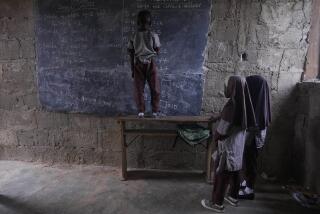Nigeria’s Optimism Sinks With Oil Price
- Share via
LAGOS, NIGERIA — Three years ago, Nigeria’s finest writer, Chinua Achebe, wrote a brief but important book about his country, “The Trouble With Nigeria,” the most populous nation in Africa. It was a cry of the heart. For most Nigerians, it could not have been pleasant reading, but Achebe captured, as no Nigerian or foreigner ever has, the essence of this troubled and troubling country.
“Nigeria is not a great country,” Achebe wrote. “It is one of the most disorderly nations in the world. It is one of the most corrupt, insensitive, inefficient places under the sun. It is one of the most expensive countries and one of those that give the least value for money. It is dirty, callous, noisy, ostentatious, dishonest and vulgar. In short, it is among the most unpleasant places on earth.”
Achebe reserved his most stinging scorn--and his blame for Nigeria’s condition--on the nation’s political leadership, which, he charged, had established an example for avarice and irresponsibility, papered over with pious expressions of patriotism, that was unrivaled in Africa.
“The Nigerian problem is the unwillingness or inability of its leaders to rise to the responsibility, the challenge, of personal example which are the hallmarks of true leadership,” Achebe wrote.
Achebe laid down his indictment at a time of particular excess in Nigerian life. Since then, two governments have gone and a third has taken control, but it is hard to see that much has fundamentally changed.
True, there is less money around, and less conspicuous misuse of it, than there was in 1983. But Nigeria is still looking for an easy way out, and it is difficult to see how Nigeria can avoid heading for very serious trouble unless its leadership begins to assume the responsibility that its predecessors have lacked.
Nigeria’s significance to Africa is often overestimated, not least by Nigerians themselves, a nation of nearly 100 million contentious citizens. Through most of the 1970s, Nigeria was awash in profits from its rich deposits of oil, but it was wracked by political instability and corruption.
A magnet for all the poorer West African nations on its borders, its cities bursting with job-seekers and clogged traffic, Nigeria seemed to believe that oil money meant a future always rosy, that every man could be a millionaire and potentate. For several years, toward the close of the 1970s, Nigeria was the world’s leading importer of champagne. It was an all-out binge.
The civilian government that came to power in 1979 rode to office on the crest of this seemingly endless celebration, and for a while did its best to continue it. Politics, as people in Nigeria said then, was the country’s only growth industry.
It was a rough and often sleazy politics, greased by patronage, kickbacks and bribes. Political figures, some of them the types of men who--in the appalled assessments of many ordinary, middle-class Nigerians--would not have been able to hold down jobs in “the real world,” were making and flaunting huge fortunes. The party had to end somehow and it did, unfortunately, in a military takeover on Dec. 31, 1983.
A period of high self-righteousness followed. The general in charge, Mohammed Buhari, launched a “war on indiscipline” aimed at putting some order into Nigeria’s chaotic daily life. It was accompanied, however, by an element of repression, the promulgation of questionable emergency decrees, the jailing of journalists and the increased influence of the national security organization, a sort of secret police.
At the same time, heavy bills from a decade of living as if there were no tomorrow began to come due. Buhari’s regime, aside from its preachy tone and its effort to blame all problems on the four years of civilian government, did little to cope with the economic slide. After 20 months in power, a bloodless coup set Buhari aside.
Since coming to power last August, Maj. Gen. Ibrahim Babangida has set still another tone in Nigeria. He has loosened Buhari’s tight controls. The posters promoting the “War Against Indiscipline” have come down; the emergency decrees muzzling the press have been lifted. And he has made a great show of opening up Nigeria’s decision-making processes to public debate.
But an unfortunate corollary of the Babangida approach is that public debate in the country is still controlled by the elite, and Babangida has shown a distinct reluctance to make the hard decisions to avoid a possibly cataclysmic economic collapse.
Nigeria’s external debt is estimated by most economists to be in the neighborhood of $17 billion. Measured beside the staggering debts amassed by Latin American nations, that may seem middling; but Nigeria’s debt, in fact, is quite serious.
More than 95% of its income is derived from oil, and oil prices have been declining sharply. Nigeria had been negotiating with the International Monetary Fund (IMF), with no agreement forthcoming for 2 1/2 years by the time Babangida came to power. With no resolution in sight, Babangida announced that he was throwing the matter open to national consensus.
Any debate involving national finance and the nuances of international economics is a complex undertaking, requiring some sophistication. That was not what Nigeria experienced. The argument over whether or not Nigeria should accede to the terms of a $2-billion IMF loan hinged on the issue of Nigerian machismo. Agreeing to IMF terms, according to the argument that carried the day, would be giving up sovereignty to international bankers--the “loan sharks” of the “international capitalist economic order.”
The true issue, Nigeria’s overregulation of its economy, was never seriously addressed or understood. An IMF program, as usual, would have taken steps to dismantle that inequitable system. Babangida, instead of using his office as a bully pulpit to inform and educate his population, sat back to see which way the wind blew.
Certainly Babangida, who has impressed diplomats and visiting journalists with a wide-ranging intelligence and sophistication, could see that the argument was skewed and that those who were arguing most insistently against the IMF were those who stood to lose by an IMF-inspired restructuring of the economy.
In the end, Babangida decided that “at the present time” Nigeria would not accept the IMF program. There are some who hope that Babangida’s words left the door open a crack and that he might change his mind in the future.
Since then, he has sent his foreign minister to London, Washington and
Paris to explain Nigeria’s plan to reschedule its debts without IMF help.
But many economic experts in Nigeria worry that what is going on is merely another example of Nigerian flimflam, sweet talk and camouflage.
The fears may be well grounded. Foreign Minister Bolaji Akinyemi’s glowing reports of his reception in the Western capitals where most of Nigeria’s debt is owed, did not, in fact, square with accounts being received by the respective embassies in Lagos.
Meanwhile, knowledgeable sources claim that well over $1 billion in current overseas letters of credit have backed up at the central bank, and payment windows have closed. The result is that Nigeria is receiving no more imports from abroad. That means that factories, already operating at no more than 30% of capacity, are being idled even further and more people are being put out of work.
The shame of it is that the “average” Nigerian does not know that, once again, he has been done over by his political leaders and the power elite. He has been told, once again, that Nigerians must rally round and bear more sacrifice to uphold Nigeria’s “national pride.”
Through it all, Babangida, praised for his calm and for putting consensus back into Nigerian politics, maintains his benign image--that of a leader who follows. When he faces a hard political decision--whether Nigeria should join an international Islamic organization, thus infuriating a powerful Christian minority--he appoints a committee, lets the committee take the heat, and keeps on smiling while his country drifts through the storm.
Chinua Achebe wrote: “Every single day of continued neglect brings (Nigeria) ever closer to the brink of the abyss. To pull her back . . . calls for greatness.”
Nigeria is still waiting to see if Babangida, amid all the strident voices, has heard the call that matters.
More to Read
Sign up for Essential California
The most important California stories and recommendations in your inbox every morning.
You may occasionally receive promotional content from the Los Angeles Times.












